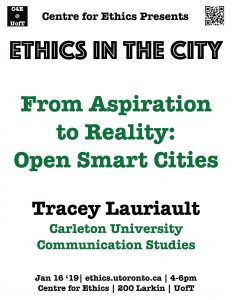
From Aspiration to Reality: Open Smart Cities
Open smart cities might become a reality for Canada. Globally there are a number of initiatives, programs, and practices that are open smart city like which means that it is possible to have an open, responsive and engaged city that is both socio-technologically enabled, but also one where there is receptivity to and a willingness to grow a critically informed type of technological citizenship (Feenberg). For an open smart city to exist, public officials, the private sector, scholars, civil society and residents and citizens require a definition and a guide to start the exercise of imagining what an open smart city might look like. There is much critical scholarship about the smart city and there are many counter smart city narratives, but there are few depictions of what engagement, participatory design and technological leadership might be. The few examples that do exist are project based and few are systemic. An open smart city definition and guide was therefore created by a group of stakeholders in such a way that it can be used as the basis for the design of an open smart city from the ground up, or to help actors shape or steer the course of emerging or ongoing data and networked urbanist forms (Kitchin) of smart cities to lead them towards being open, engaged and receptive to technological citizenship.
This talk will discuss some of the successes resulting from this Open Smart Cities work, which might also be called a form or engaged scholarship. For example the language for the call for tender of the Infrastructure Canada Smart City Challenge was modified to include as a requisite that engagement and openness be part of the submissions from communities. Also, those involved with the guide have been writing policy articles that critique either AI or the smart city while also offering examples of what is possible. These articles are being read by proponents of Sidewalk Labs in Toronto. Also, the global Open Data Conference held in Argentina in September of 2018 hosted a full workshop on Open Smart Cities and finally Open North is working toward developing key performance indicators to assess those shortlisted by Infrastructure Canada and to help those communities develop an Open Smart Cities submission. The objective of the talk is to demonstrate that it is actually possible to shift public policy on large infrastructure projects, at least, in the short term.
☛ please register here
Tracey Lauriault
Carleton University
Communication Studies
Wed, Jan 16, 2019
04:00 PM - 06:00 PM
Centre for Ethics, University of Toronto
Rm 200, Larkin Building
